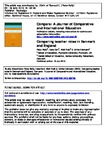Comparing teacher roles in Denmark and England
| dc.contributor.author | Kelly, Peter | |
| dc.contributor.author | Dorf, H | |
| dc.contributor.author | Pratt, Nicholas | |
| dc.contributor.author | Hohmann, Ulrike | |
| dc.date.accessioned | 2013-06-19T15:28:34Z | |
| dc.date.available | 2013-06-19T15:28:34Z | |
| dc.date.issued | 2013-06-18 | |
| dc.identifier.issn | 1469-3623 | |
| dc.identifier.issn | 1469-3623 | |
| dc.identifier.uri | http://hdl.handle.net/10026.1/1545 | |
| dc.description | Comparing teacher roles in Denmark and England | |
| dc.description.abstract |
This article reports the findings of a comparative study of teaching in Denmark and England; its broader aim is to help develop an approach for comparing pedagogy. Lesson observations and interviews identified the range of goals towards which teachers in each country worked and the actions these prompted. These were clustered using the lens of Bernstein’s pedagogic discourse (1990; 1996) to construct teacher roles which provided a view of pedagogy. Through this approach we have begun to identify variations in pedagogy across two countries. All teachers in this study adopted a variety of roles; of significance was the ease with which competent English teachers moved between roles. The English teachers observed adopted roles consistent with a wider techno-rationalist discourse. There was a greater subject emphasis by Danish teachers whose work was set predominantly within a democratic humanist discourse, whilst the English teachers placed a greater emphasis on applied skills. | |
| dc.format.extent | 566-586 | |
| dc.language | en | |
| dc.language.iso | en | |
| dc.publisher | Taylor & Francis (Routledge) | |
| dc.subject | comparative pedagogy | |
| dc.subject | Danish teaching | |
| dc.subject | English teaching | |
| dc.subject | teacher roles | |
| dc.title | Comparing teacher roles in Denmark and England | |
| dc.type | journal-article | |
| dc.type | Article | |
| plymouth.author-url | https://www.webofscience.com/api/gateway?GWVersion=2&SrcApp=PARTNER_APP&SrcAuth=LinksAMR&KeyUT=WOS:000337958700005&DestLinkType=FullRecord&DestApp=ALL_WOS&UsrCustomerID=11bb513d99f797142bcfeffcc58ea008 | |
| plymouth.issue | 4 | |
| plymouth.volume | 44 | |
| plymouth.publication-status | Published | |
| plymouth.journal | Compare | |
| dc.identifier.doi | 10.1080/03057925.2013.800786 | |
| plymouth.organisational-group | /Plymouth | |
| plymouth.organisational-group | /Plymouth/Faculty of Arts, Humanities and Business | |
| plymouth.organisational-group | /Plymouth/Faculty of Arts, Humanities and Business/Plymouth Institute of Education | |
| plymouth.organisational-group | /Plymouth/REF 2021 Researchers by UoA | |
| plymouth.organisational-group | /Plymouth/REF 2021 Researchers by UoA/UoA23 Education | |
| plymouth.organisational-group | /Plymouth/Research Groups | |
| plymouth.organisational-group | /Plymouth/Research Groups/Institute of Health and Community | |
| plymouth.organisational-group | /Plymouth/Users by role | |
| plymouth.organisational-group | /Plymouth/Users by role/Academics | |
| dcterms.dateAccepted | 2013-06-18 | |
| dc.identifier.eissn | 1469-3623 | |
| dc.rights.embargoperiod | Not known | |
| rioxxterms.versionofrecord | 10.1080/03057925.2013.800786 | |
| rioxxterms.licenseref.uri | http://www.rioxx.net/licenses/all-rights-reserved | |
| rioxxterms.licenseref.startdate | 2013-06-18 | |
| rioxxterms.type | Journal Article/Review |


